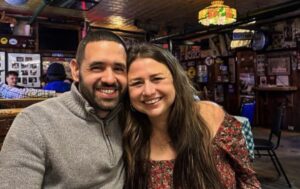This story is part of a larger feature on 10 do-gooders from Saratoga and the rest of the Capital Region. To meet the other nine honorees and purchase tickets for annual fundraising event, visit our Capital Region Gives Back event page.
When millions of Ukrainian refugees, after running for their lives, found themselves tragically homeless in countries not their own, Adam Israel knew he had to help—and fast. Within weeks of Russia’s initial invasion of the country early this year, Israel was on a flight to neighboring Poland, carrying cards and cash.
In those early days, blurred by fear of the unknown, the hundreds of donated cards Israel passed out at the Ukraine/Poland border delivered messages of hope (hence the initiative’s name “Letters of Hope for Ukraine”)—plus $20 cash. Israel and his wife, Kasia, had years prior organized boxes of supplies to be sent to the (twice) hurricane-ravaged island of St. Thomas. In 2022, cash was more practical: People can donate in seconds via Venmo, and the cash proved the quickest way for refugees to be able to buy exactly what they needed (aided by a favorable exchange rate), after a quick stop at a money exchange.
“My wife is Polish, and we lived there during Covid,” Israel says. “We own a cabin and car there, close to the border, and her brother is there. We had to help.”
Kasia stayed in Saratoga with the couple’s two children, and Israel met hundreds of refugees, passing out his cards and money, wishing people well. On a return trip, he helped drive refugees out of Ukraine and into Poland, with Kasia often on the phone, calming them in Polish. (Each trip took three to six hours.) Now back in Saratoga, there are displaced Ukrainians, living in churches or donated apartments, who need food and a place to live.
“One mom fled with her 4-year-old son as bombs were exploding, and now the kid won’t leave the house without his snow suit on, even during the summer,” Israel says. “A mom and daughter’s home blew up with them in it, and Mom lost an eye. These people fled in terror and now need counseling and healthcare—they have socialized healthcare there, so no one has insurance. And they simply have nowhere to go.”















